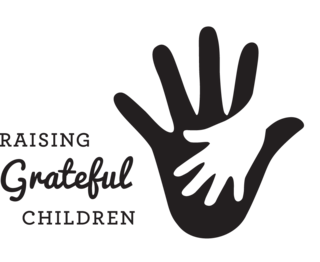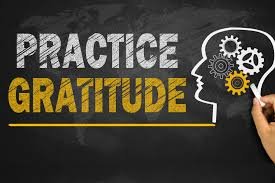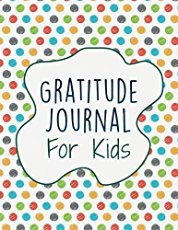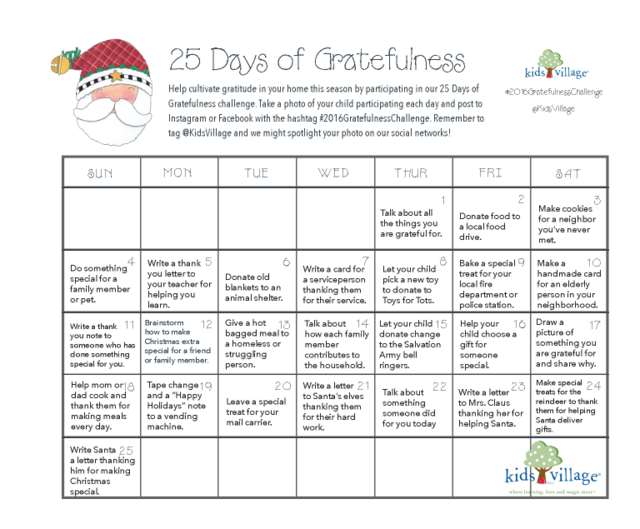Cultivating an Attitude of Gratitude in Children.

Gratitude does not come naturally to children. If it is not taught and stressed, young children may not fully grasp it.
Children should be taught to say “Thank You” from an early age. Perhaps long before they even understand the concept.

Practising gratitude and helping/encouraging young children to do it will have many benefits.
Froh et al.(2008), conducted their own research showing grateful “young adolescents (ages 11-13) are happier and more optimistic vs less grateful counterparts. They are also more satisfied with their school, family, community, friends, themselves, give more emotional support to others and have better social support themselves.”
Froh et al. (2011), also discovered that “grateful teens (ages 14-19) are more satisfied with their lives, use their strengths to better their community, are more engaged in their schoolwork and hobbies, have higher grades, and are less envious, depressed, and materialistic.”
Studies have shown that children who regularly reflect with gratitude report a higher level of life satisfaction, more positive relationships with others, and more enjoyment of school. Laura Lebovitz, Grow Counseling.
Gratitude can help reduce anxieties: it helps being mindful, focussing on the Now’s, the present moment. This is something that needs to be practiced everyday as it isn’t easy to do. It is however, very rewarding.
“A study by Dr. Emmons shows that gratitude has a direct impact on happiness levels, sometimes as high as 25 percent. While many of these same studies show that children may not immediately benefit from gratitude practices, cultivating the habit can still have a positive influence on them in their lives.” Kids Village
“A study by Mindy Ma et al., provides promising evidence that gratitude can play a critical role in protecting at-risk adolescents’ from the difficulties of their lives, possibly by broadening their mindsets and building their personal resources and coping skills.”Greater Good Science Centre
When children learn gratitude, gratitude is what will fill their mind. It offers stability and helps them feel less anxious, making it easier to forge better relationships.
......
Ways in which children may learn gratitude are:
- Be an example as a parent - Practice gratitude for all the things and moments we take for granted.
For example, the comfort of home, food, caring parents and relatives, pets, etc.

Appreciate the Now, say Thank You, send blessings and encourage the world along with yourself.
It also helps to keep a gratitude journal.
Write them down.
Let your children see you do it. Appreciate your kids, let them know how they make you grateful. You may even keep a journal and help very young children write. Make them feel appreciated.Show your children that you are thinking of others, appreciate the beauty of nature, a smile from another or even a good meal.

Another way is to have a gratitude jar decorated by family members. Family members may write short appreciations or even draw pictures. Take time to read the notes together and get your kids to talk about it.
‘Train’ your kids to write Thank You notes for gifts, day to day appreciations, whether it is to Mum or Dad or the bus driver. Very young children may also give stickers as Thank You's.
The Kids Village has great tips to cultivate gratitude and a fun 25 Day Gratitude Challenge! Lot’s of fun for kids and adults.

Gratitude does not work like magic but practicing it builds it in your mind. Being brought up to be grateful will help a child all his/her Life.
Trying to make grateful kids isn’t just an issue for families; it’s an issue for society as well. Society desperately needs to harness the power of gratitude. As our world becomes more culturally diverse and digitally connected, and as complex societal problems mount, gratitude may help catalyze the motivation and skills youth need to succeed not just academically but in the “life test” too. We must all do our part to help kids develop into moral adults, who will contribute to a world of compassion and care. Froh & Bono, 2014
Follow me @Rainbowsky.
Further Reading:
Grateful schools are happy schools
Seven Ways To Foster Gratitude In Kids
How to Teach Kids to Be Grateful: Give Them Less
Kids Village - Teaching Gratitude In Children & 25 Day Gratitude Challenge
The energy of gratitude in spiritual practise is the most clear and useful for a human being!
I can't agree more! In thanks there is abundance. :)
100% True! Karl Barth once said: Joy is the simplest form of gratitude. :)
What a great post! Something that parents don't really do anymore, at least none that I know, is to say grace before a meal. Even if you aren't religious, it helps to express what you are grateful for when eating together as a family and thanking the person who prepared the meal.
Congratulations @rainbowsky! You have completed some achievement on Steemit and have been rewarded with new badge(s) :
Click on any badge to view your own Board of Honnor on SteemitBoard.
For more information about SteemitBoard, click here
If you no longer want to receive notifications, reply to this comment with the word
STOPBy upvoting this notification, you can help all Steemit users. Learn how here!